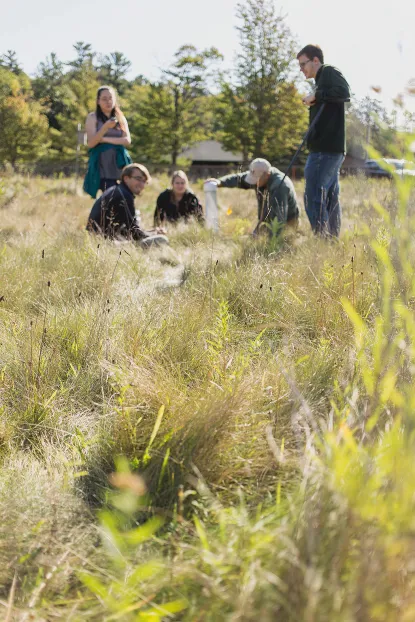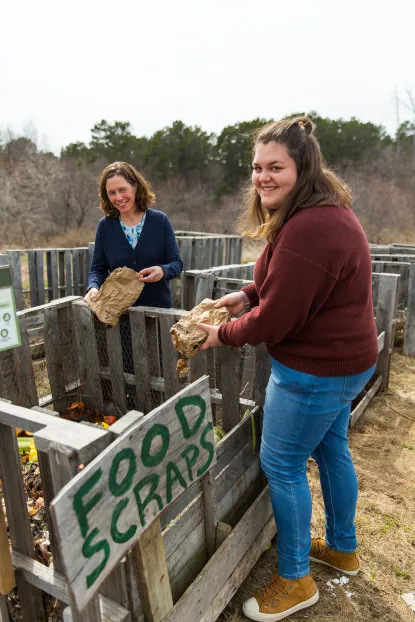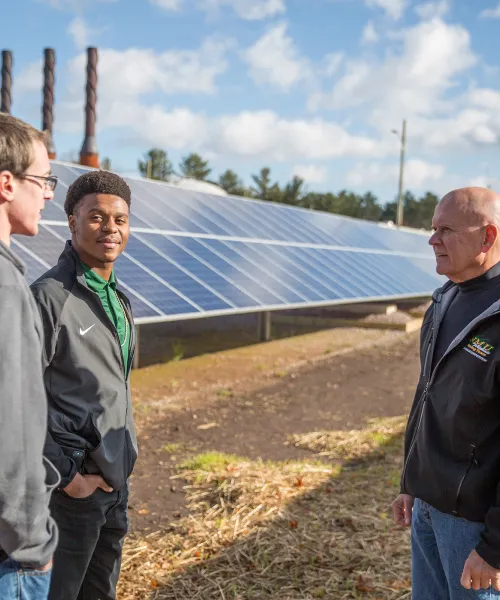
Sustainability Initiatives
Sustainable actions are commonly defined as those that meet the needs of the present without compromising the ability of future generations to meet their own needs. Most definitions of sustainability emphasize the intersection of environmental protection, economic development and social equity. Thus, a focus on sustainability reinforces other Focus Areas such as Diversity, Equity and Inclusion and Rural Roots. Building a Culture of Sustainability will require a comprehensive strategy that infuses sustainability considerations into all university-wide decision-making, curricula and outreach efforts. This coordinated approach builds on existing goals outlined in NMU's 2030 Sustainability Plan and Campus Energy Master Plan, which have been developed in consultation with the Sustainability Advisory Council, the Carbon Neutrality Task Force and the efforts of many students, staff and faculty across campus. Coordinating these efforts will bring NMU's performance in this area to the next level, and will promote NMU's reputation as a regional leader in sustainability.

Focus Goals
G1: Sustainability as a driver in campus decision-making
- Emphasize sustainability in operations and in campus-wide policies
G2: Environmental sustainability support
- Implement first steps towards achieving carbon neutrality by 2050
- Improve waste and recycling efforts
- Provide a sustainable dining experience
G3: Sustainability curricula
- Create new, interdisciplinary sustainability curricula, including hands-on learning experiences
- Educate students and community about different sustainability principles and practices
G4: Sustainability beyond the classroom
- Build local and regional partnerships to expand educational opportunities
- Support applied sustainability-related research
Sustainability Focus Goals Strategy
| Item | Strategy | Oversight | Goal Alignment | Focus Area Key Metrics | Timeline |
|---|---|---|---|---|---|
| 1 | Continue to develop an inter-departmental Sustainability Hub for Innovation & Environment (SHINE) to promote sustainability efforts | Academic Affairs | G1, G2, G3, G4 |
Establishment of a location and budget Expansion of programs |
2022 |
| 2 | Create Campus Energy Master Plan and a plan for Carbon Neutrality by 2050 |
Facilities Finance and Administration |
G1, G2 | Development of both plans | 2022 |
| 3 | Explore Leadership in Energy and Environmental Design (LEED) certification for all new campus infrastructure |
Facilities Finance and Administration |
G1 | LEED scorecard completion for each project | 2024 |
| 4 | Transition university fleet to hybrid or electric vehicles |
Finance and Administration Purchasing |
G1, G2 | Bid comparison for each new vehicle | 2024 |
| 5 | Develop composting systems on campus |
Dining Facilities Finance and Administration |
G1, G2 | Implementation of system for each Dining venue | 2022 |
| 6 | Implement sustainability practices in all aspects of Dining operations, including residence hall and community dining venues, retail, concessions and catering operations |
Dining Finance and Administration |
G2 | Number of practices implemented | 2023 |
| 7 | Create a sustainability certification program that is accesible to a wide range of audiences | Academic Affairs | G3 | Establishment of program | 2023 |
| 8 | Use the student-initiated Green Fund to implement sustainability initiatives | Sustainability Advisory Council | G1, G2, G3, G4 | Number of implemented initiatives | 2024 |
| 9 | Work with local partners to provide internships, service projects, educational experiences and research opportunities |
Academic Affairs Center for Student Enrichment |
G1, G2, G3, G4 | Number of opportunities provided | 2023 |
